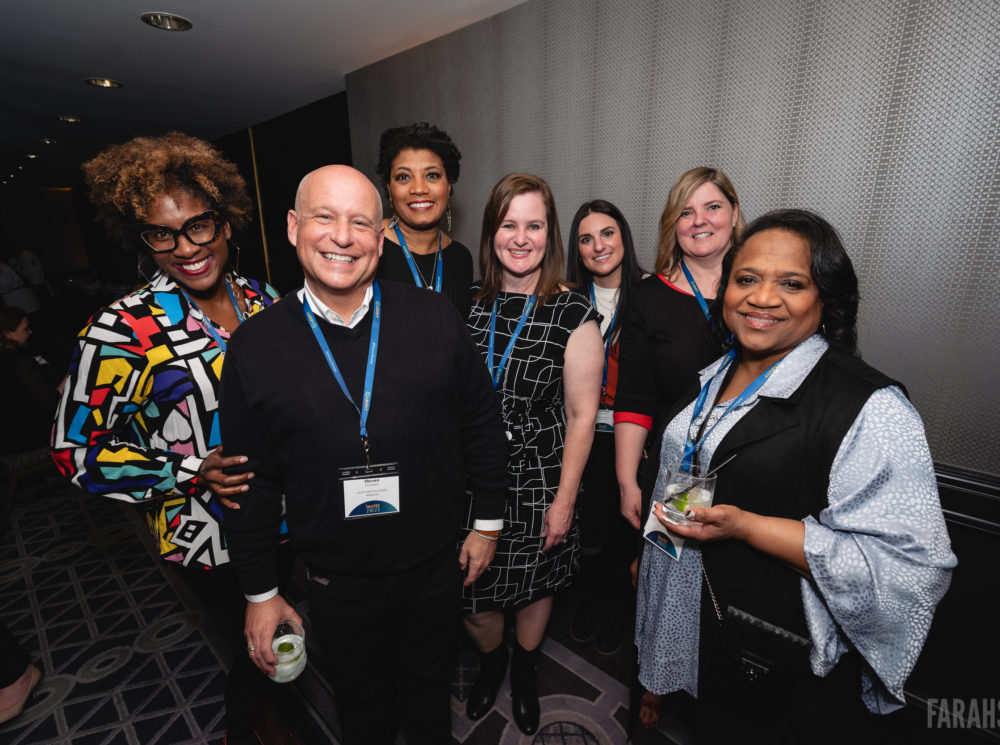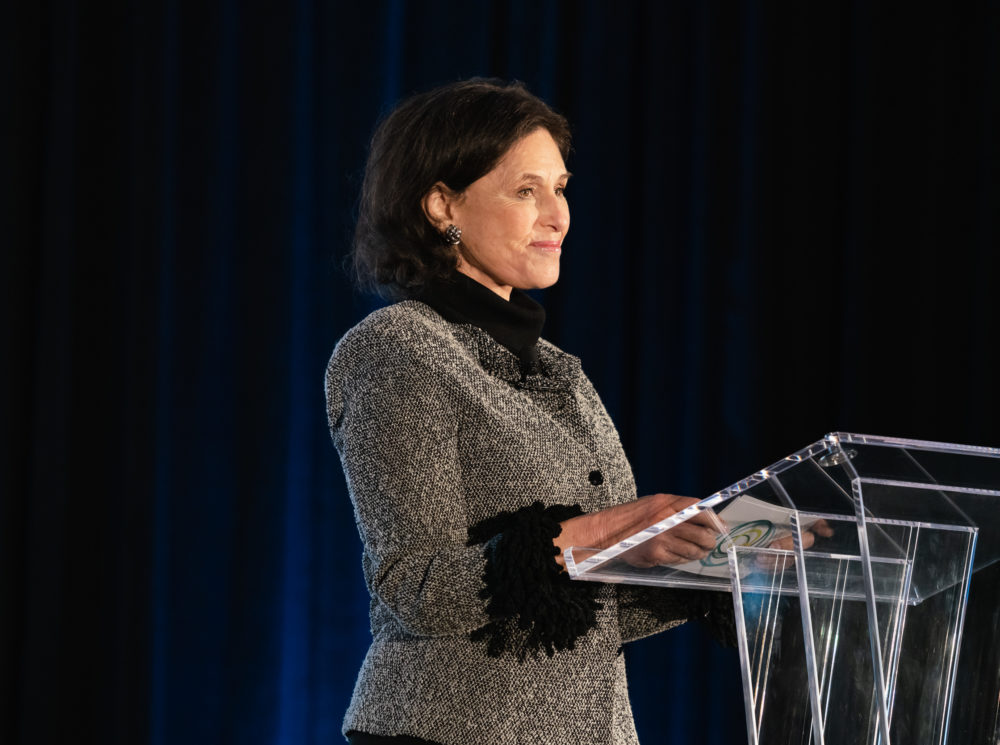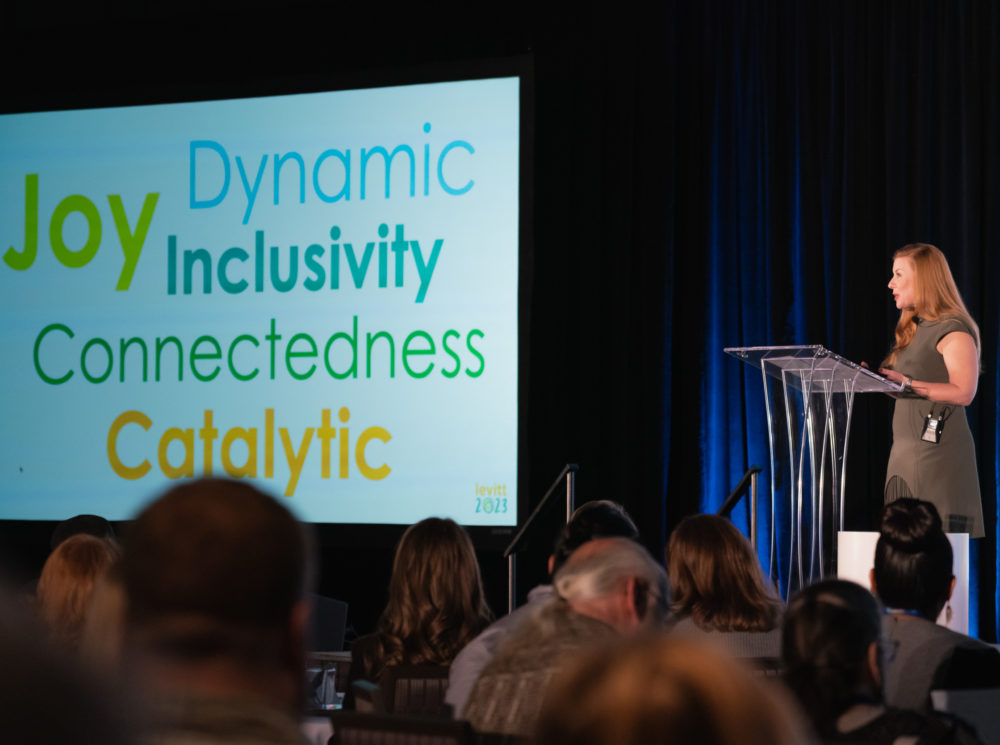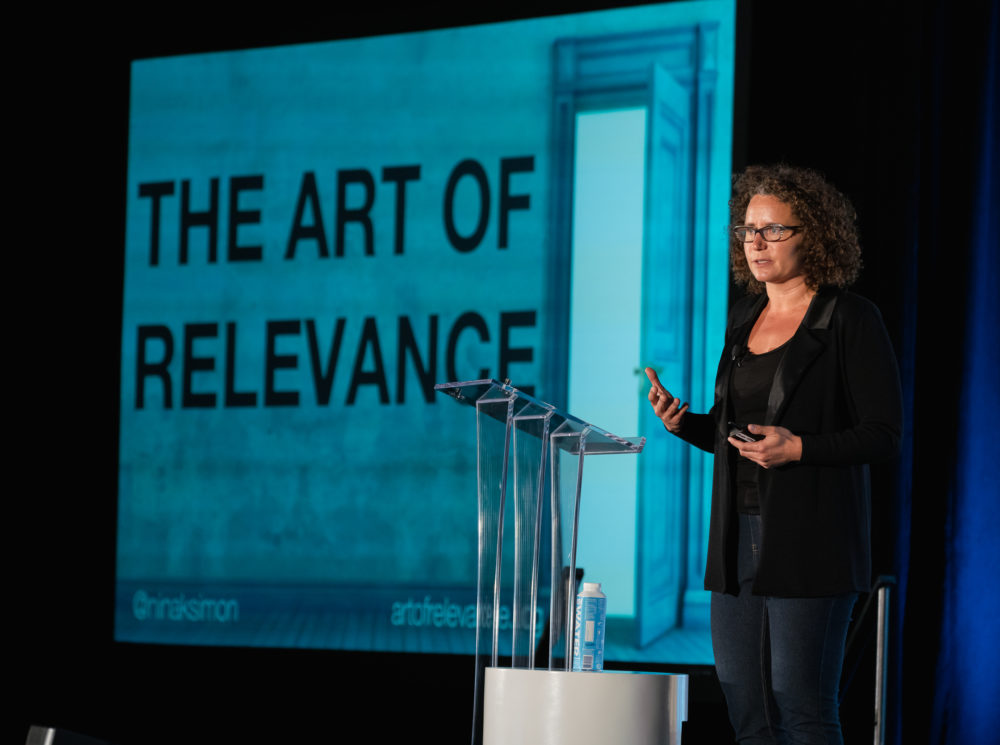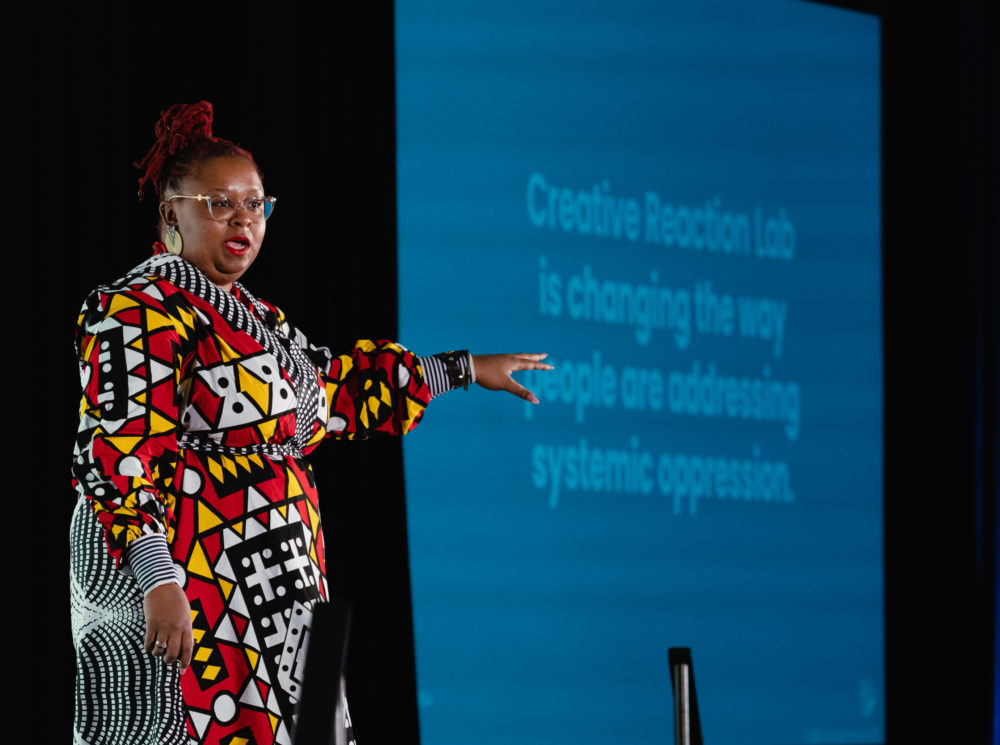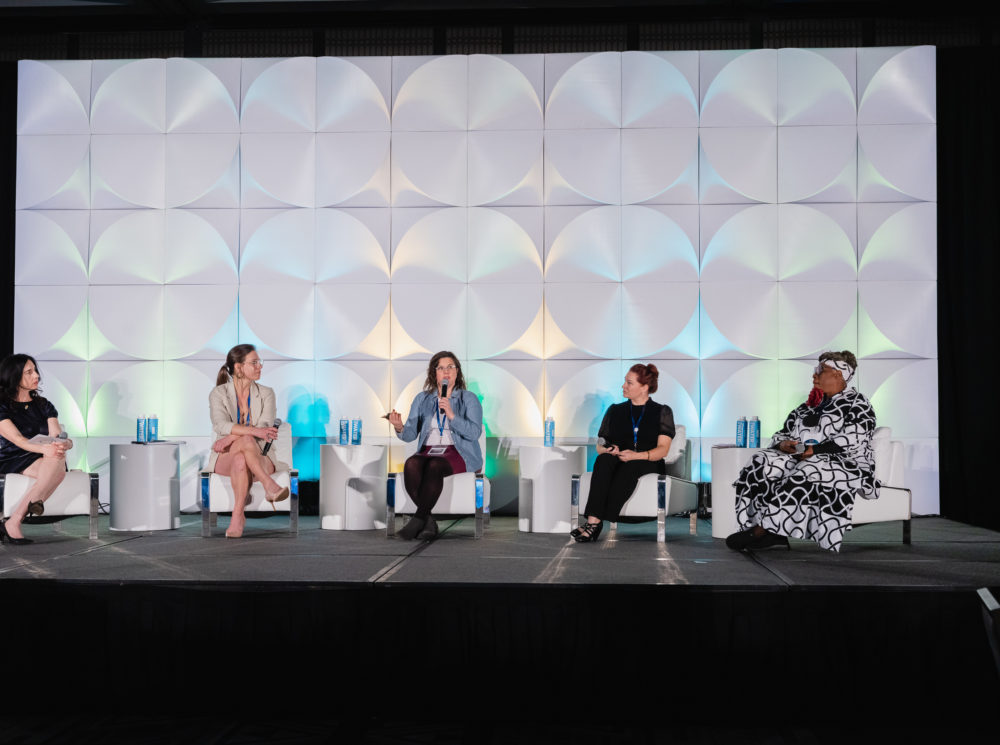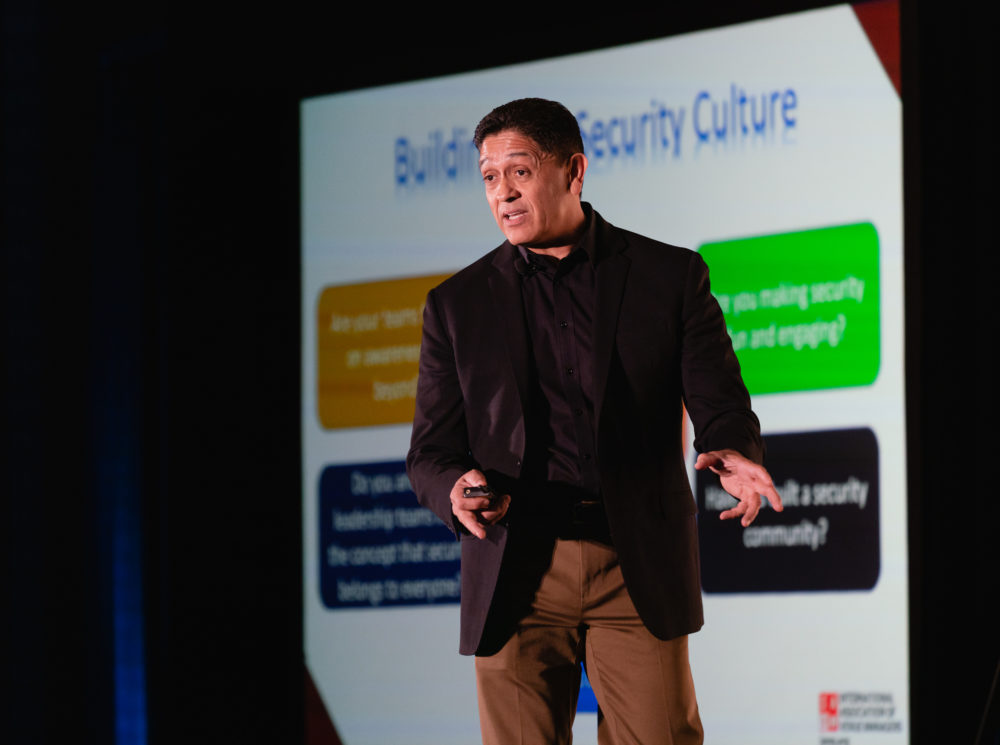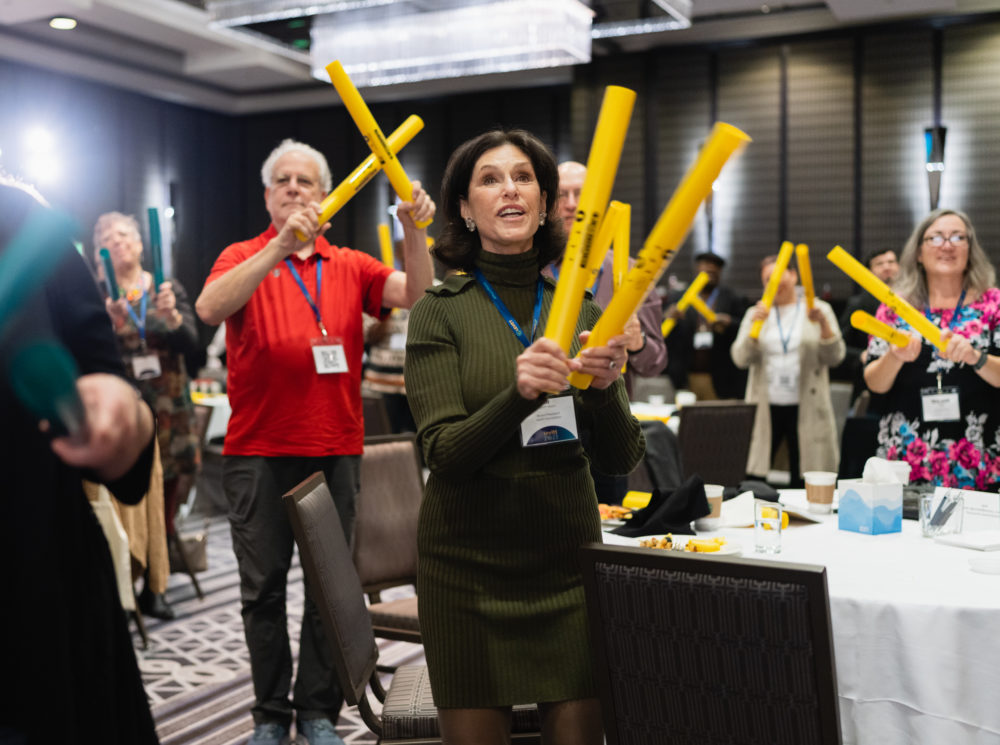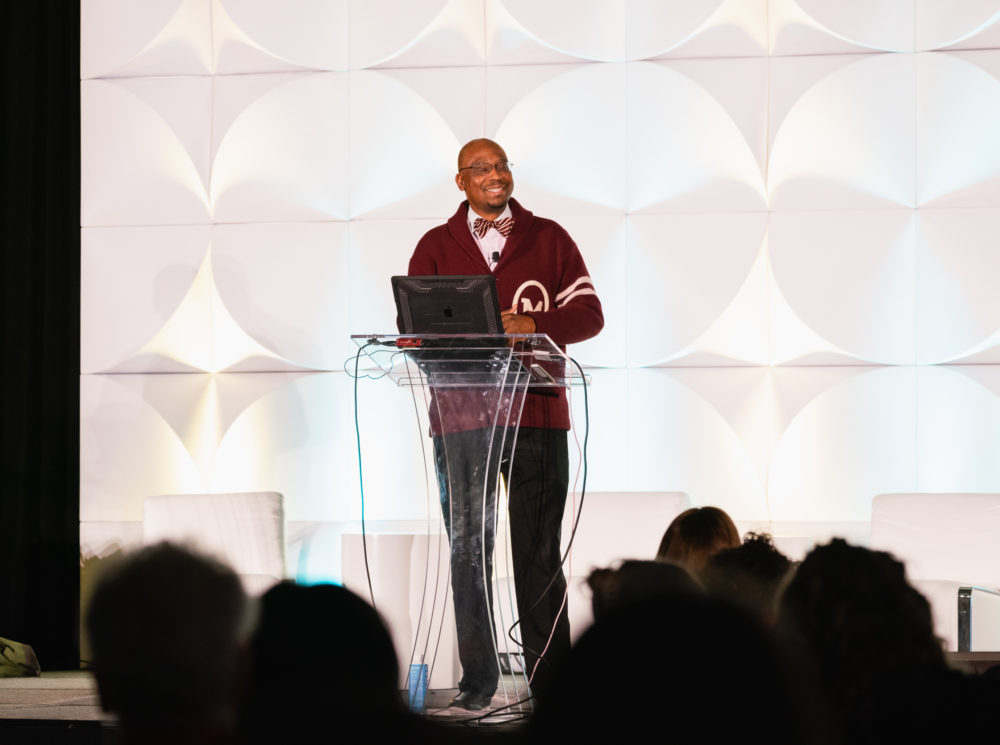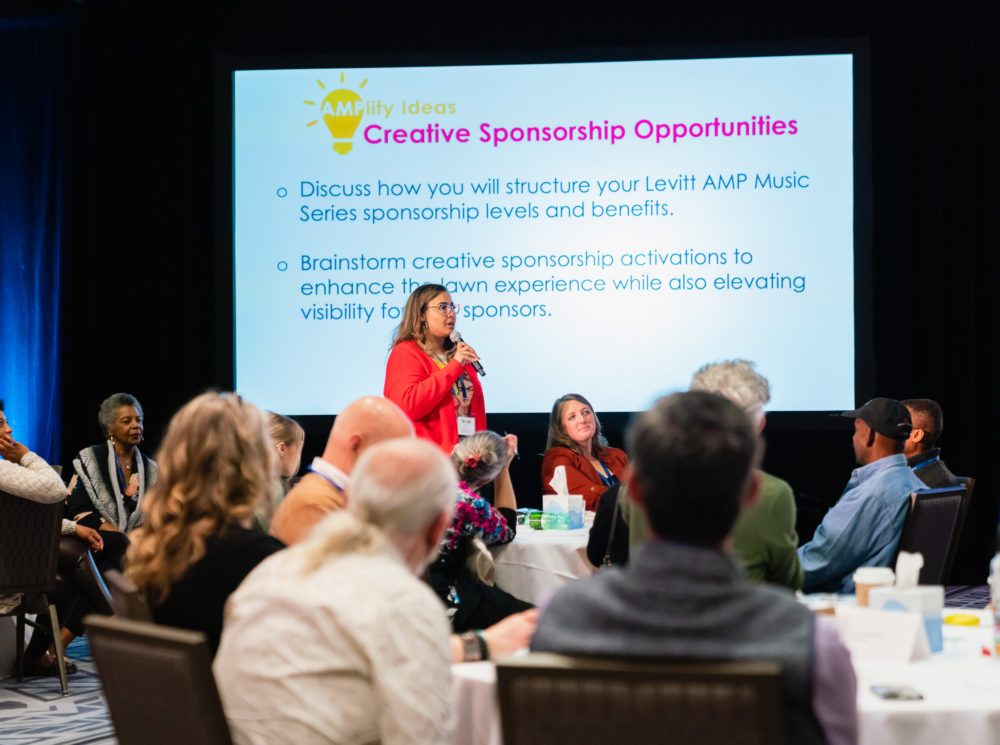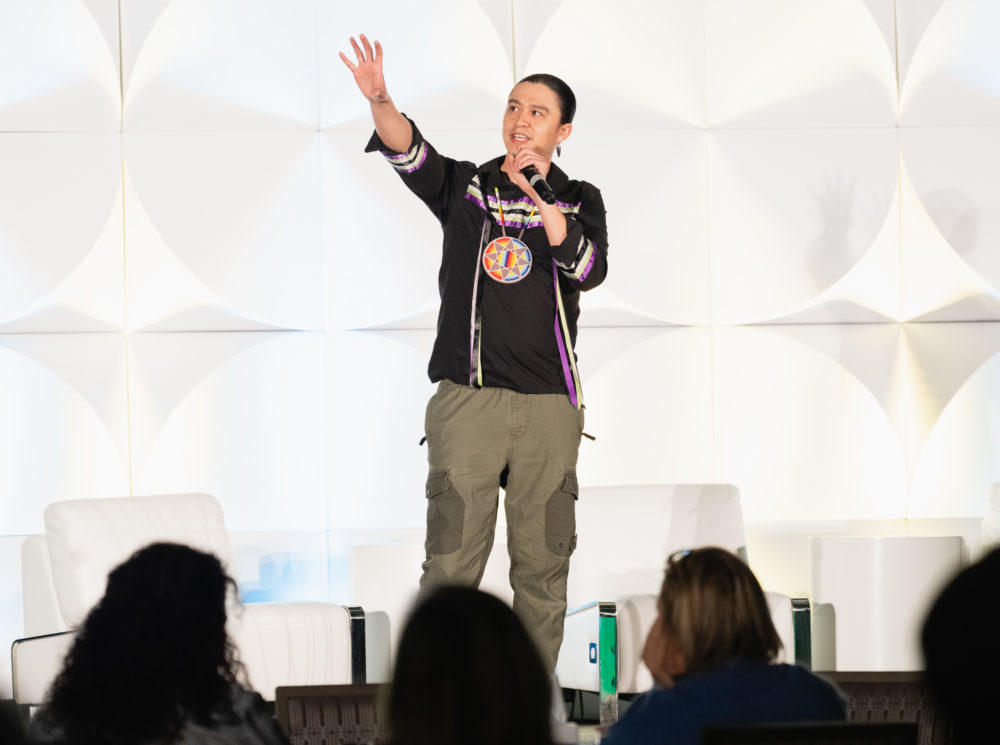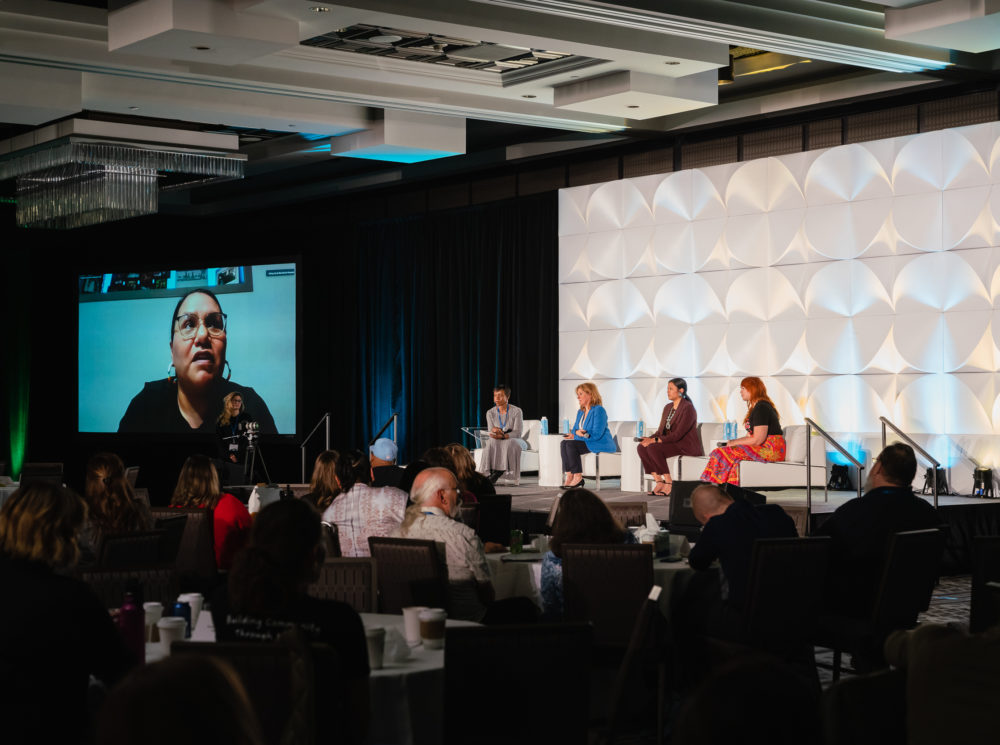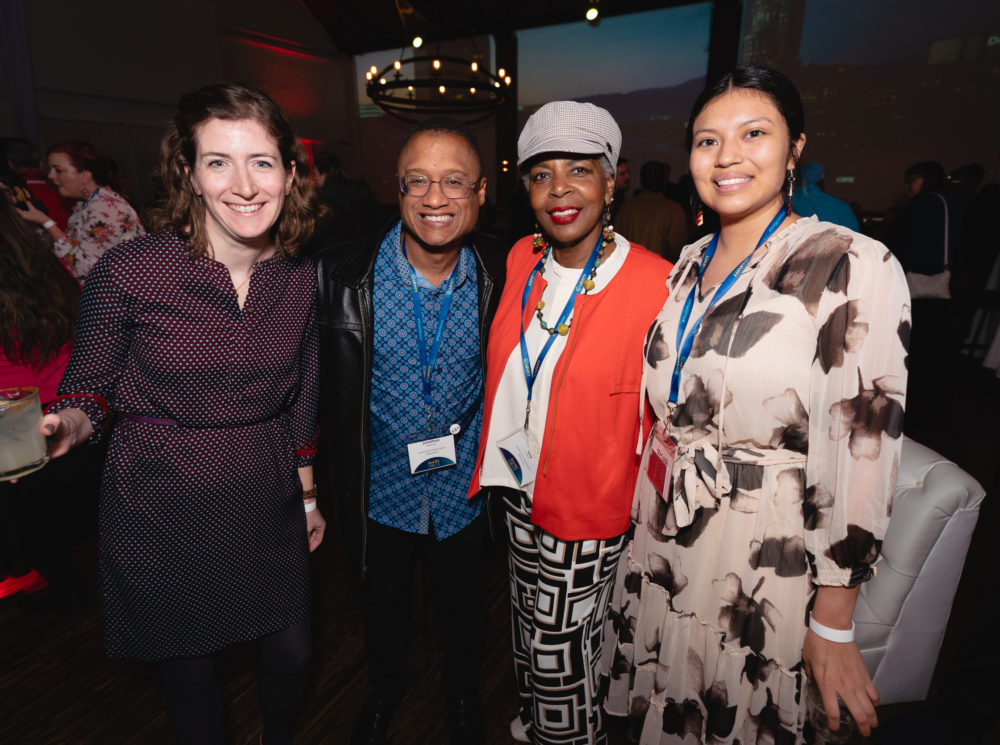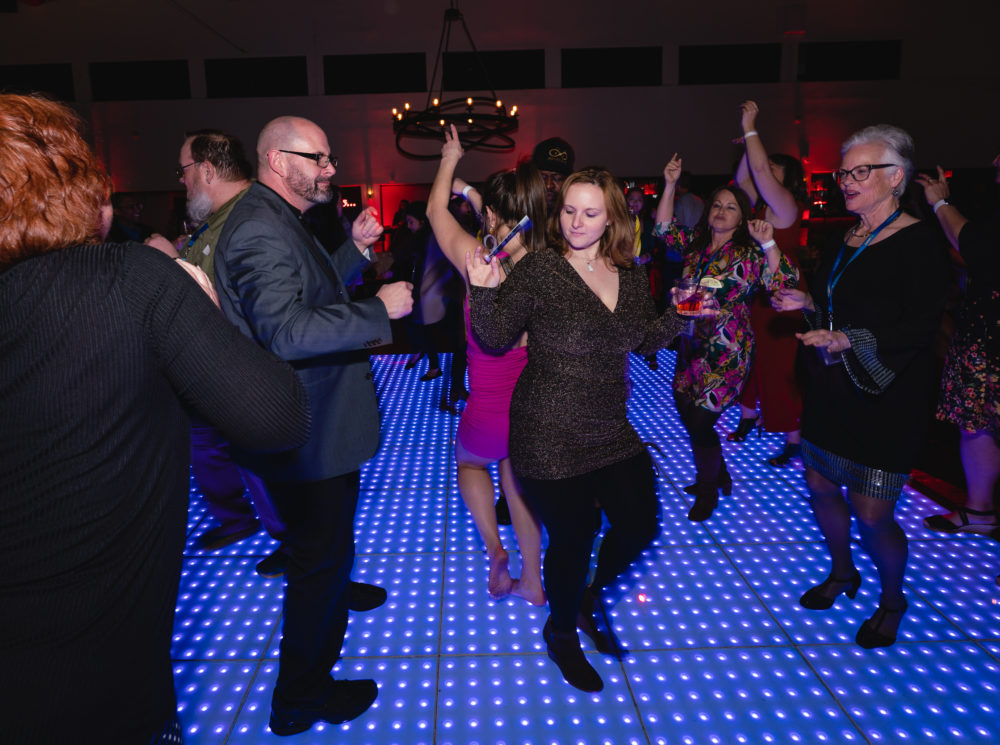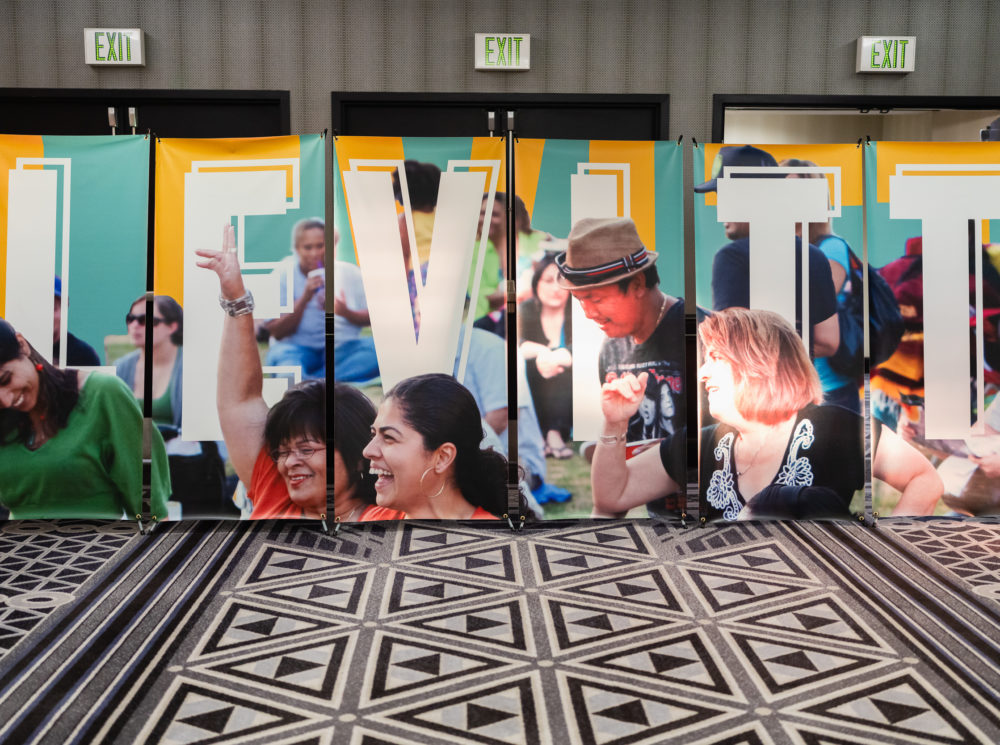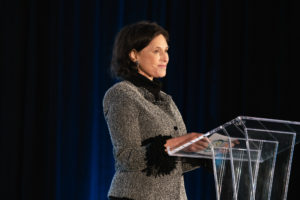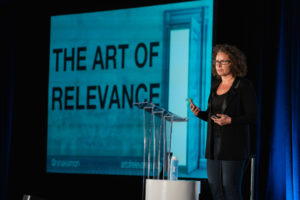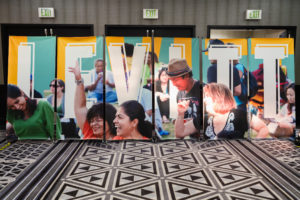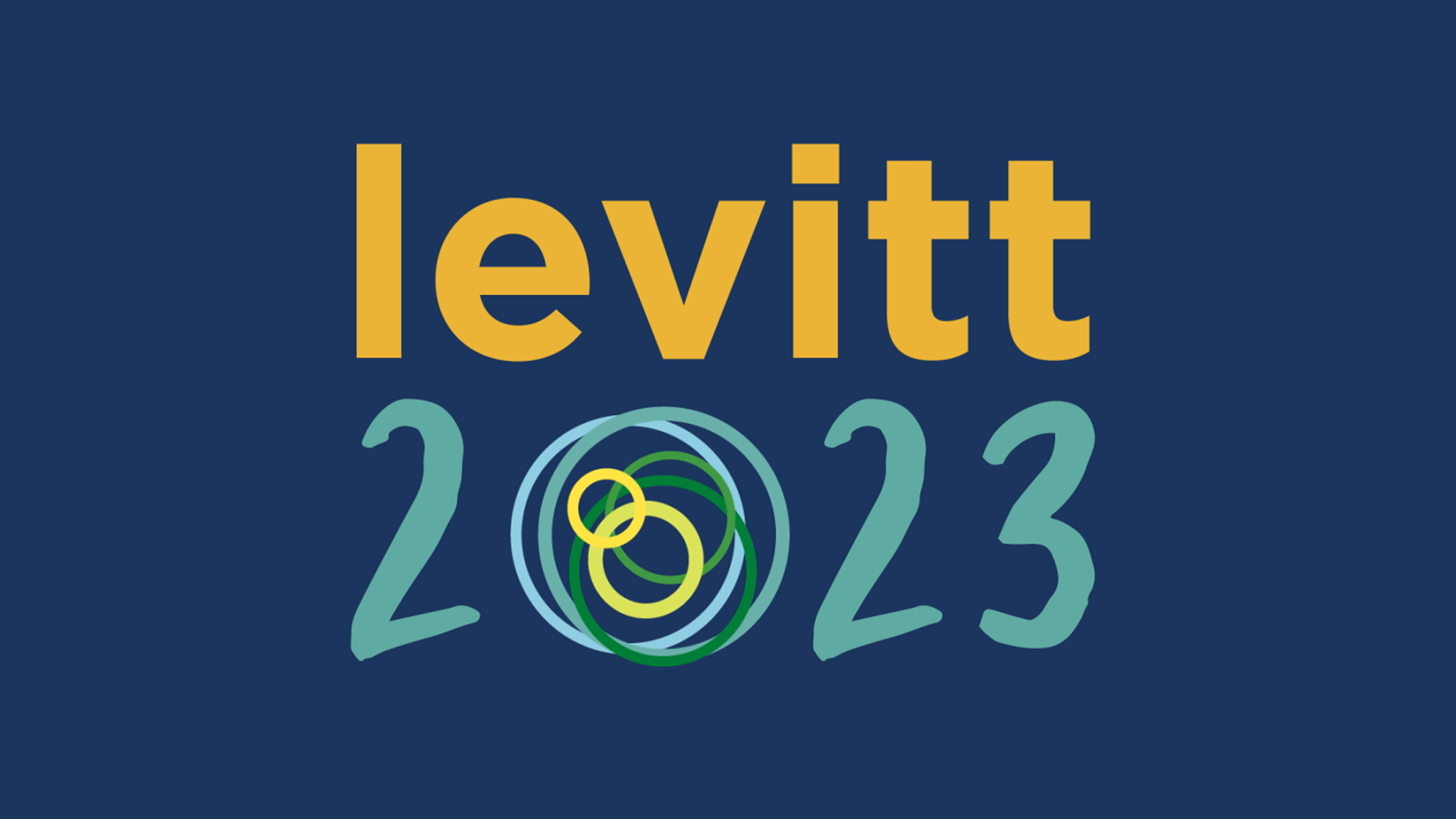
Bringing together over 150 people from the Levitt network of 41 towns and cities, the 2023 Levitt National Convening was a joyful gathering, inspiring exchange of ideas and celebration of collective impact. While Southern California sunshine was in short supply given the historic rainfall, the Levitt network’s spirit of collaboration and community-mindedness shone through brightly, as Levitt Foundation grantees and partners from Levitt venues and AMP sites across the country came together in Downtown Los Angeles this past February. Through Levitt network panels, nationally-recognized guest speakers, affinity group breakout sessions, artist performances, and plenty of opportunities to connect, attendees hailing from Hawaii to New Jersey, Wisconsin to Florida and more than two dozen other states shared valuable insights and experiences, together advancing the Levitt mission to build community through music.
During this year’s Levitt National Convening, speakers and panelists explored three main themes: the power of free, live music to create more inclusive, equitable public spaces; developing authentic, reciprocal partnerships to deepen impact; and ensuring that programs remain relevant and reflective of all members of the community. Taken together, these themes set the framework for a national movement to strengthen the social fabric of America through free outdoor concerts.
Read on for the 10 key takeaways from the 2023 Levitt National Convening.
Inspiring impact.
In her welcome remarks on Friday morning, Levitt Foundation Board President Liz Levitt Hirsch reflected on how the positive impact of the Levitt program has inspired more towns and cities to commit to this community-driven approach that prioritizes the arts, public space and community building. “In 2003 we were just two venues—two!” she said, recalling the Foundation’s earlier days. “Today we are 41 communities, and just think of where we’re heading! It’s exciting. And your commitment fuels the dynamic that drives us forward.”
The value of joy.
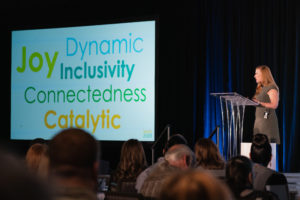
Levitt Foundation Executive Director Sharon Yazowski frames the Levitt network’s dynamic impact through the lens of shared values.
Levitt Foundation Executive Director Sharon Yazowski set the tone for the weekend by sharing the Foundation’s overarching mission and core values to build equitable, healthy and thriving communities through free, live music. “You are the changemakers at the intersection of arts and social impact,” she told Convening attendees, “And the Levitt Foundation is your proud partner.” Yazowski highlighted the dynamic effects that Levitt concerts have on public spaces and communities, for example the way the Levitt AMP series in Middlesboro, Kentucky and Stevens Point, Wisconsin have helped reenergize downtowns, to the leadership role that Levitt Pavilion Denver and Levitt Pavilion Arlington have taken in spearheading citywide cultural events. She also shared findings from the Levitt Foundation’s multi-year research projects, which reflect the social and economic impact of Levitt programs and offers a blueprint of best practices for organizations to carry out Levitt’s mission of fostering connections and building social capital. A throughline to her entire address was the way the Levitt program brings joy (a core value of the Levitt Foundation) to individuals and each of the communities it touches. “If joy were our only value,” she asked, “wouldn’t that be enough to make our case for why free concerts matter?”
Get outside of your comfort zone.
In her plenary “The Art of Relevance,” Nina Simon, bestselling author and former Executive Director of the Santa Cruz Museum of Art and History, shared valuable lessons drawn from her experiences transforming a once sleepy museum into a vital community resource. Much like many Levitt venues and AMP grantees have discovered for themselves, Simon found that the key to unlocking greater relevance for her own institution was engaging with previously untapped community members as partners, and being willing to experiment with new ideas and approaches. “Opening doors to outsiders changed our museum,” she said. The question cultural and arts institutions should ask themselves, she noted, is not “how do we ‘get’ new people? But what are we willing to change to be relevant to more people?” And a willingness to change, she emphasized, inherently involves the risk of ruffling feathers along the way. “There is not a no-friction version of this story. But relevance is an exercise in empathy—finding out what is relevant to other people by asking them, rather than telling them.”
Collaborate to redesign unequal spaces.
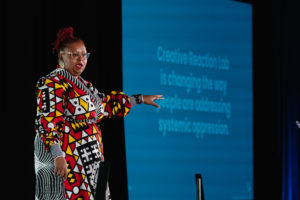
Antoinette Carroll of Creative Reaction Lab presents her engaging workshop, “Equity-Centered Community Design: Centering Community Members as Experts.”
Antoinette Carroll, the Founder, President and CEO of Creative Reaction Lab, shared strategies for building more inclusive venues and concert sites in her workshop, “Equity-Centered Community Design: Centering Community Members as Experts.” Central to her philosophy is the idea that any system that is oppressive or inequitable is there by design, and therefore it can be redesigned—and this includes public spaces. How does one redesign public spaces to be more welcoming? Involve other community members as designers. “There are so many ways we could design spaces to be more inclusive,” she said, “but that requires inviting diverse co-creators to be a part of the process. You can’t say you’re building inclusive spaces if you’re the only designer.” In reflecting on how design is about intention and activation, Carroll reminded attendees that engaging community voices is an integral component to creating inclusive and welcoming spaces.
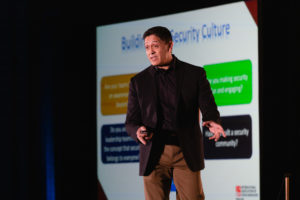
Law enforcement veteran Mark Herrera delivers his plenary, “Situational Awareness and Risk Mitigation in Public Spaces.”
Keeping public safety top of mind.
Drawing on his decades of experience in law enforcement and with the Department of Homeland Security, plenary speaker Mark Herrera offered techniques for public safety at live music venues and outdoor spaces in his address, “Situational Awareness and Risk Mitigation in Public Spaces.” Recognizing the vulnerabilities of outdoor spaces where audiences gather, Herrera spoke to the importance of always keeping public safety top of mind and walked attendees through ways to greatly enhance awareness of their surroundings to identify potential threats within their environments. He emphasized that planning for public safety must be a priority for every concert, to ensure a coordinated and timely response in the event of an emergency situation.
We all have hidden biases.
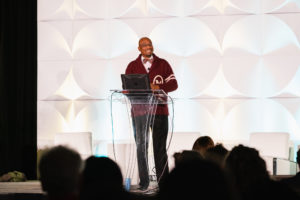
Morehouse College professor Rev. Dr. Bryant T. Marks connects revealing data and insight during his plenary, “The Hidden Bias of Good People: Implications for Outdoor Music Venues and the Communities They Serve.”
Morehouse College professor and founder of the National Training Institute on Race and Equity Rev. Dr. Bryant T. Marks led Convening attendees through interactive activities while unpacking the topic of implicit bias in his plenary, “The Hidden Bias of Good People: Implications for Outdoor Music Venues and the Communities They Serve.” In addition to explaining the psychology of bias and sharing some revealing studies—for example, Americans’ strongest negative implicit attitudes are directed toward the elderly—Dr. Marks also addressed the ways that implicit bias can show up in the live music space. “Venue staff may favor certain artists, or assume certain artists are more likely to appeal to some audiences,” he noted, adding: “Implicit bias also may make it more or less likely that some artists are approached for partnerships or deeper engagement.” Understanding one’s own implicit biases, he noted, is the first step toward building more inclusive programming in public spaces.
Show up for your partners—every time.
For the panel discussion, “Inspiring a Chain of Change Through Partnerships & Co-Creation,” Levitt Foundation Deputy Director Vanessa Silberman moderated a panel featuring representatives from Levitt AMP Ocala and Levitt AMP St. Johnsbury who shared how, through developing new and deepening existing community partnerships, they’ve expanded the cultural footprint of their concert series, inspiring a chain reaction of positive changes along the way.
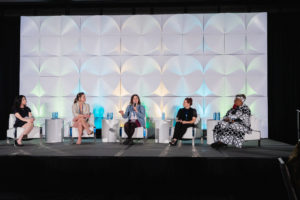
Levitt Foundation Deputy Director Vanessa Silberman (left) with Levitt AMP St. Johnsbury’s Molly Stone and Gillian Sewake and Levitt AMP Ocala’s Leslie Nottingham and Dr. Dwanette Jackson-Dilworth during the Levitt Network Panel “Inspiring a Chain of Change Through Partnerships and Co-Creation.”
For St. Johnsbury, Vermont, this meant launching a series of pop-up concerts downtown, creating exposure for businesses and giving local artists and musicians in this mostly rural area a platform to share their art with the larger community. Thanks to years of thoughtful partnership-building with its chamber of commerce, Discover St. Johnsbury, Catamount Arts was positioned to present the pop-up series when the opportunity arose in 2020. According to Molly Stone, Artistic Director of Levitt AMP presenter Catamount Arts: “It all starts with a capital P: Patience. We have a human tendency to want to just drop an event into a place. But that’s not sustainable, and it doesn’t build trust. It took well over a decade and tiny bits of iterative work, patience, and ongoing commitment.”
Levitt AMP Ocala’s Leslie Nottingham echoed Stone’s sentiments, noting that when it comes to developing partnerships, “It’s not just about showing up, it’s about showing up every time. If you drop the ball once, your partners will wonder if you’re really there for them. There are no shortcuts.”
In Ocala, Florida, the Levitt AMP program has partnered with local organizations like the Martin Luther King Jr. Commemorative Commission and the Ocala Juneteenth Celebration Commission for a host of projects, including the restoration of a Black history mural that surrounds the concert site. The goal of these partnerships is to bring this once heavily segregated town together as “one Ocala,” uniting the community’s east side with the historically under-resourced west side through intentional programming. As MLK Commemorative Commission’s Dr. Dwanette Jackson-Dilworth noted: “By having concerts on the west side, we knew that we weren’t being left out. We were a collective community coming together.”
Move at the speed of trust.
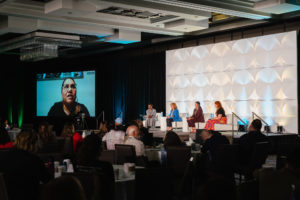
Sarah Bad Warrior-Vrooman (left), Director of Wokini and Tribal Relations at South Dakota State University, joins via video with Levitt Foundation Director of Programs Victoria Bridenstine, Levitt at the Falls Executive Director Nancy Halverson, and Levitt Pavilion Denver staffers Helen Gover and Jessi Whitten for the panel, “Beyond Land Acknowledgement: Fostering Authentic Relationships with Indigenous Communities.”
The Levitt network panel, “Beyond Land Acknowledgement: Fostering Authentic Relationships with Indigenous Communities,” emphasized the importance of building trust among community partners, especially those who represent historically underserved communities, by allowing them to set the tone and pace of collaborations. Moderated by Levitt Foundation Director of Programs Victoria Bridenstine, the discussion featured two Levitt communities: Sioux Falls, South Dakota and Denver. Nancy Halverson, Executive Director of Sioux Falls’ Levitt at the Falls, and Sarah Bad Warrior-Vrooman, Director of Wokini and Tribal Relations at South Dakota State University discussed engaging with South Dakota’s Indigenous communities. Last summer, Levitt Sioux Falls collaborated with the Smithsonian’s Lemelson Center for the Study of Invention and Innovation, as well as partners on the Pine Ridge Lakota Reservation, to organize Innoskate, a multi-day skateboarding and music event, which included a day of activities on the reservation.
“The best thing about Innoskate was that it was not an extractive activity in any way,” Halverson said. Bad Warrior-Vrooman even noted that other tribes have since reached out to her to discuss holding similar events in their own communities. Halverson added, the key to developing a mutually beneficial partnership with the Pine Ridge community was “having a person from the community to be your connector, to introduce you to people, and to help you learn the temperature of the community.”
Also on the panel, Levitt Pavilion Denver staffers Helen Gover and Jessi Whitten discussed the upcoming All My Relations Celebration, a festival of Native art and music at Levitt Denver which will kick off its inaugural festivities this August. “When we’re producing a show or an event that’s culture-facing like this, we don’t get to set the tone of the event,” Whitten explained. “Our cultural partners do. You have to move to a support role and let them set the tone. And you have to move at the speed of trust.”
As an example, Gover, the coordinator of the Native art and music festival, added: “You need to have credibility and relevance. Make sure you’re going to pow-wows or other festivals. It’s important to reflect on your intention in going out to this culture.”
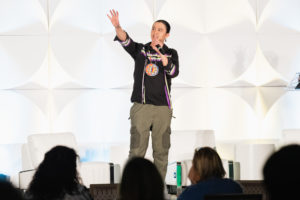
Lakota hip-hop artist Frank Waln shares music and insight about engaging with Indigenous culture during his performance and conversation.
If you ask, they will come.
Award-winning Lakota musician and writer Frank Waln offered both music and powerful reflections of his lived experience during his artist performance and conversation. In between spellbinding renditions of his songs—which ingeniously combine traditional Lakota wind instruments with hip-hop—Waln called upon the Levitt network to engage with Indigenous musicians and dancers to help decolonize spaces that were once the home to Native peoples. “If you’re working toward a vision of justice in the United States that does not include Native peoples, you’re not working toward justice, because we are all on Native land.” Waln said. “But if you work with Native artists, we can help figure out what to do with this history and how to move forward together… Anywhere your venues are, there are Native artists and communities. And if you ask them, they will come. We’ve been waiting for the spaces and places to tell our story.”
Building connections, deepening relationships.
A meaningful component of Levitt gatherings is the space and time for attendees to develop new connections and deepen relationships through social activities and shared experiences, from cultural walking tours to lively receptions to collective musicmaking, reflecting the Levitt Foundation’s core values of joy and connection. And there was ample opportunity at this year’s Convening! Cultural walking tours gave attendees the opportunity to experience some of LA’s most iconic neighborhoods in a small-group setting, while the opening night reception brought new and familiar faces together for engaging conversations that would continue throughout the weekend. And music moved us throughout the weekend, with attendees participating in a round of collective musicmaking with boomwackers led by rhythm facilitator and percussionist Christopher Ramirez, to sharing moves and grooves to the tunes of saxophonist Grace Kelly, the danceable mixes of DJ Ari-4Rari, and LA’s premier all-female salsa band, Las Chikas!
As the Levitt network continues to grow to include more communities throughout the country, we are inspired to see how the movement to strengthen the social fabric of America through free outdoor concerts is accelerating. As the 2023 Levitt concert season gets underway, with more than 650+ free concerts being presented nationwide, we’re excited to see how these Convening takeaways are put into practice throughout the year on Levitt lawns across the country by the incredible changemakers bringing the Levitt program to life. Meanwhile, we’re already looking forward to next year’s Levitt National Convening in Los Angeles. Stay tuned for details!

